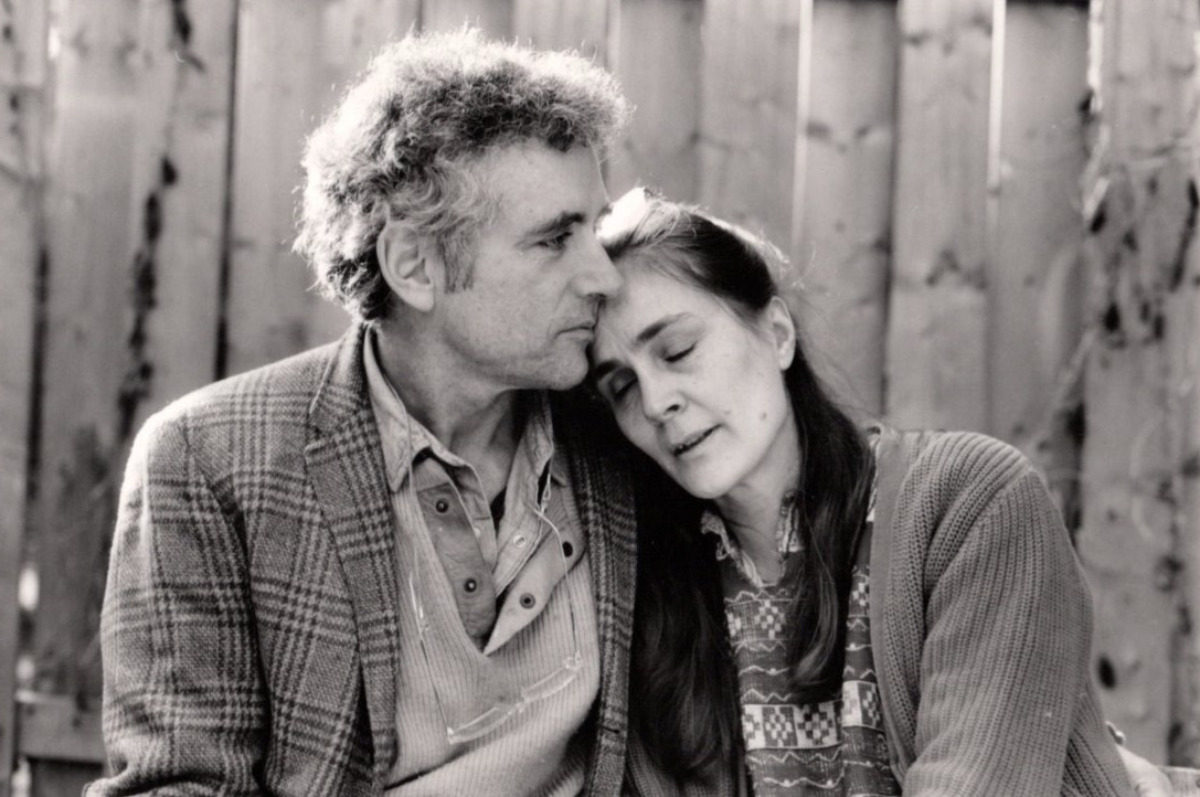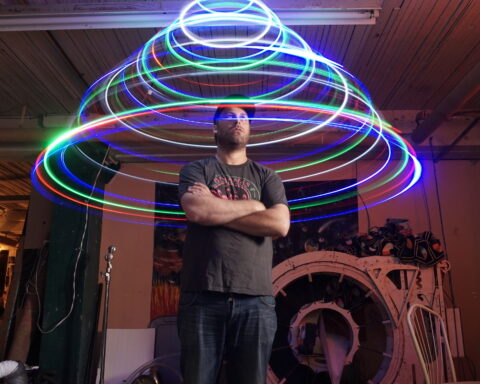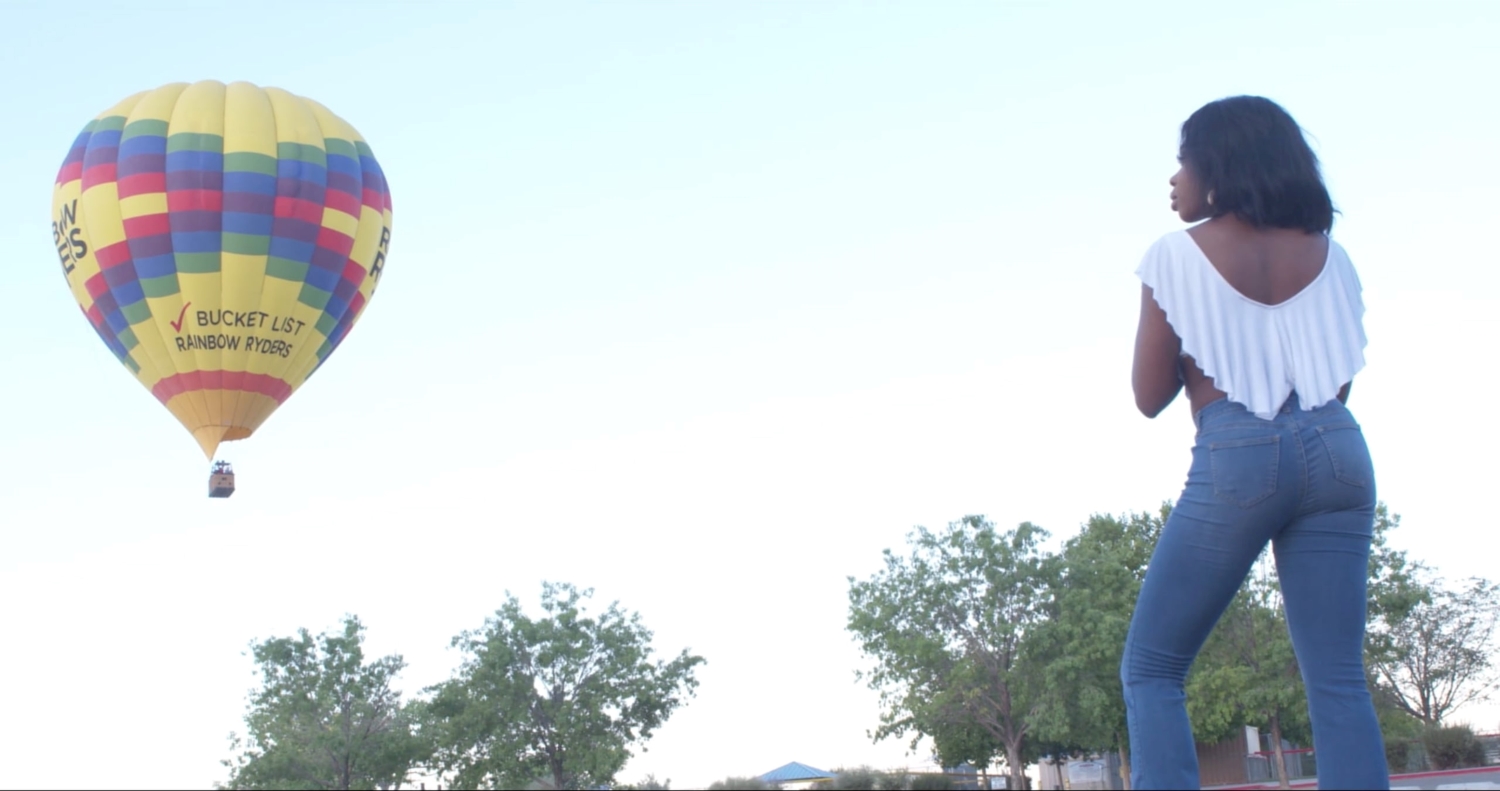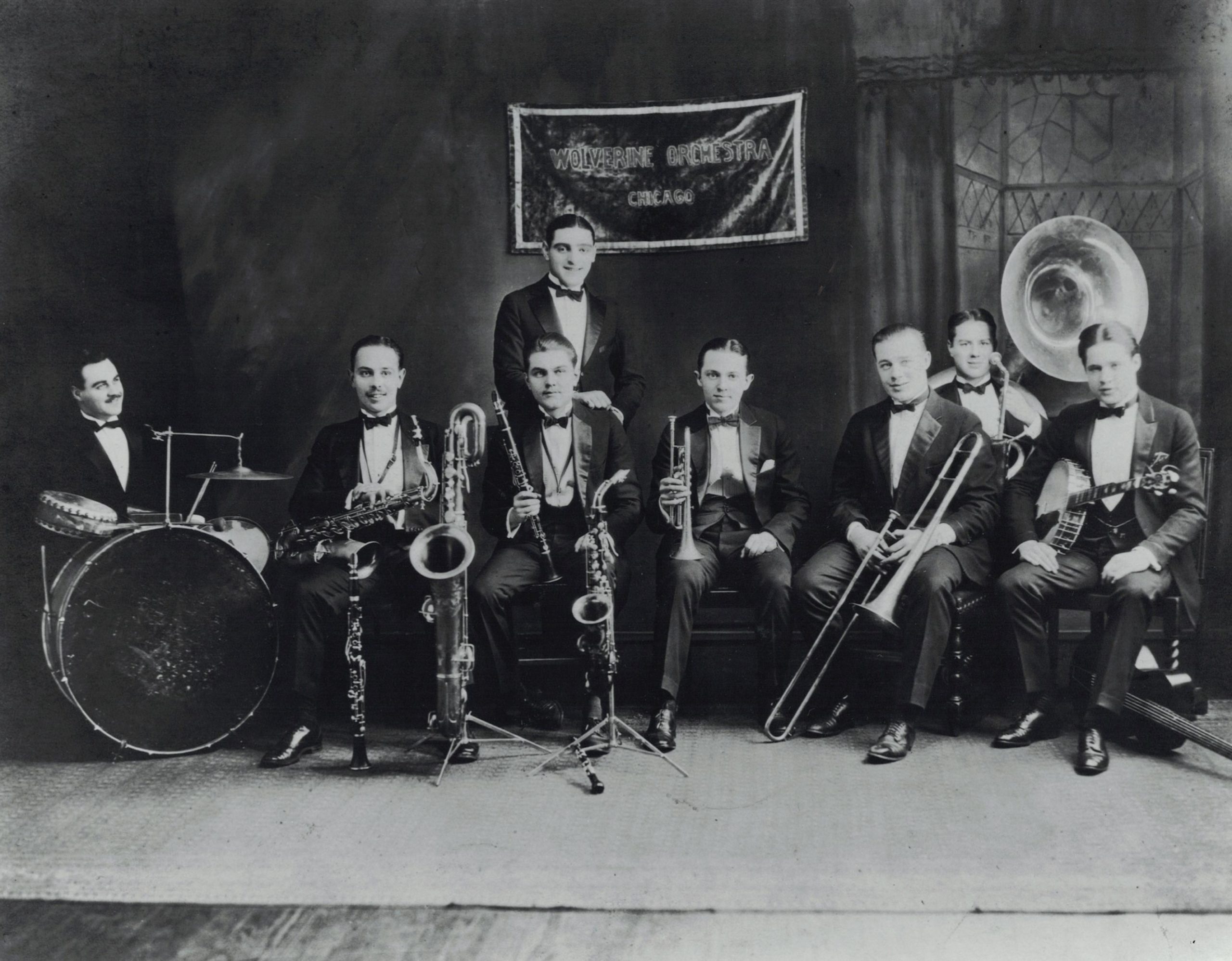Back in the summer of 2017, Martin Duckworth and I were at Montreal’s Quartier des Spectacles checking out a venue’s soundboard for a concert shoot we would be doing that night. By pure chance, Duckworth had gotten hold of the gizmo he needed to wirelessly sync the venue’s soundboard to his camera. The event was a show by African reggae star, Alpha Blondy. I was handling the shoot for a doc called Reaching for Zion while the film’s director, Irene Angelico, and producer/DP Abbey Neidik were filming in Israel on the same project, about the links between Judaism and Rastafari via its main character, Bob Marley’s granddaughter, Donisha Prendergast.
Duckworth, one of Canada’s most prolific documentary cinematographers and directors, had brought his wife Audrey Schirmer along. At that point, Schirmer was suffering from advanced Alzheimer’s disease, but she was being typically herself, all beaming smiles and enjoying the warm, sunny afternoon. In Jeremiah Hayes’s NFB/Cineflix film Dear Audrey, which focuses on Duckworth’s relationship with his wife, he talks about Audrey’s fascination with clouds, plants, and the unfolding spectacle of people being themselves on the streets.
Suddenly, Duckworth stopped tinkering with equipment and jerked his head around. Audrey had disappeared. We searched for her in bars and restaurants on Boulevard Saint-Laurent until Duckworth said, “It’s all right, she’ll find her way.” I drove him to his duplex apartment on the Plateau Montreal, which he and Audrey shared for years, and called about 15 minutes later. She “just appeared on the porch,” he said with relief, and a trace of his typically wry amusement with life’s little surprises.
“What I find fascinating about that,” says Hayes, whose touching doc on Audrey and Duckworth won the audience award at November’s Montreal International Documentary Festival (RIDM), “is that when she wandered off, rather than stopping her, or trying to control where she was going, Martin would simply follow her out of curiosity. I thought it was amazing that he would have such a gentle passive way of dealing with her walking off.”
Hayes, who made a poetic film about his mother’s struggle to live with ALS (amyotrophic lateral sclerosis), set up and filmed a typical episode of Audrey wandering with Duckworth following behind her. There’s a moment of humour when he says that neither his wife nor he had any idea where she was going, and a deeply poignant embrace that ends the scene.
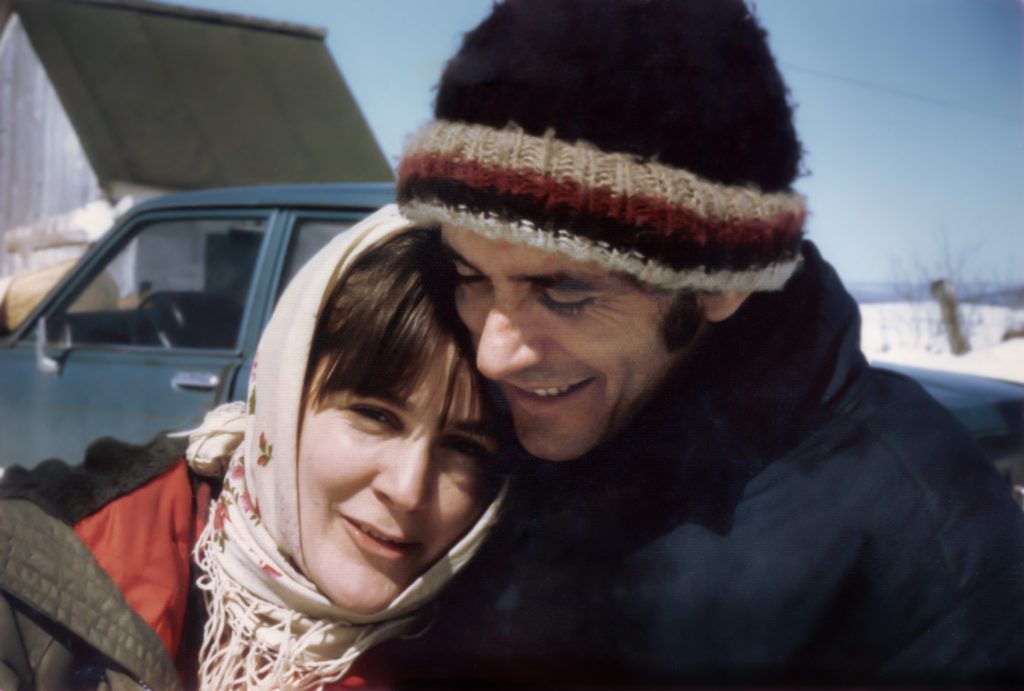
Dear Audrey opens with Duckworth jogging at a snail’s pace and segues to Audrey and him in their apartment. Throughout the film, Hayes shows them in a kind of perpetual dance. Even when he’s at his laptop, or the piano, or puttering around the kitchen, they beam into each other on an inexplicable wavelength. He’s not entirely sure she knows who he is, but they smile at each other, touch, and synchronize back bends on a country porch. She whistles, tousles his hair, and he says that she likes his hairdo. If something seems funny, they both giggle as if a current of humour runs through them. Does she consciously get the joke? It doesn’t really matter. In one scene, Duckworth says that he began to love her even more after her diagnosis of Alzheimer’s. They never stopped loving and enjoying each other up to her death in 2019. Hayes talks about her “shadowing” him everywhere and taking comfort in his presence.
When I interviewed Duckworth in his Plateau apartment, Audrey’s presence was noticeably absent. She had always been there with a smile and a hug, and now she wasn’t. “Audrey changed so slowly, and retained all of her basic characteristics,” Duckworth told me. “I was hardly aware of the change taking place. We continued to make love, as always. And she continued driving for many years. Even when losing her sense of memory and being lost, it was hardly any different for me. It’s funny, no matter how much she disintegrated as a person, she remained strongly the Audrey I had known.”
Dear Audrey offers a picture of a relationship involving a partner with Alzheimer’s that defies stereotypes. Audrey didn’t pick up car keys thinking she had to drive the kids to school. She was never aggressive. “She led her life as such a gentle person, it sort of carried on,” says Hayes. Audrey was never uncomfortable about the filming, Hayes continues, and he was fascinated by how “she was always just a few feet away from Martin as he walked around the apartment, or on the street. I always thought that made her feel more secure and comfortable, knowing where he was.”
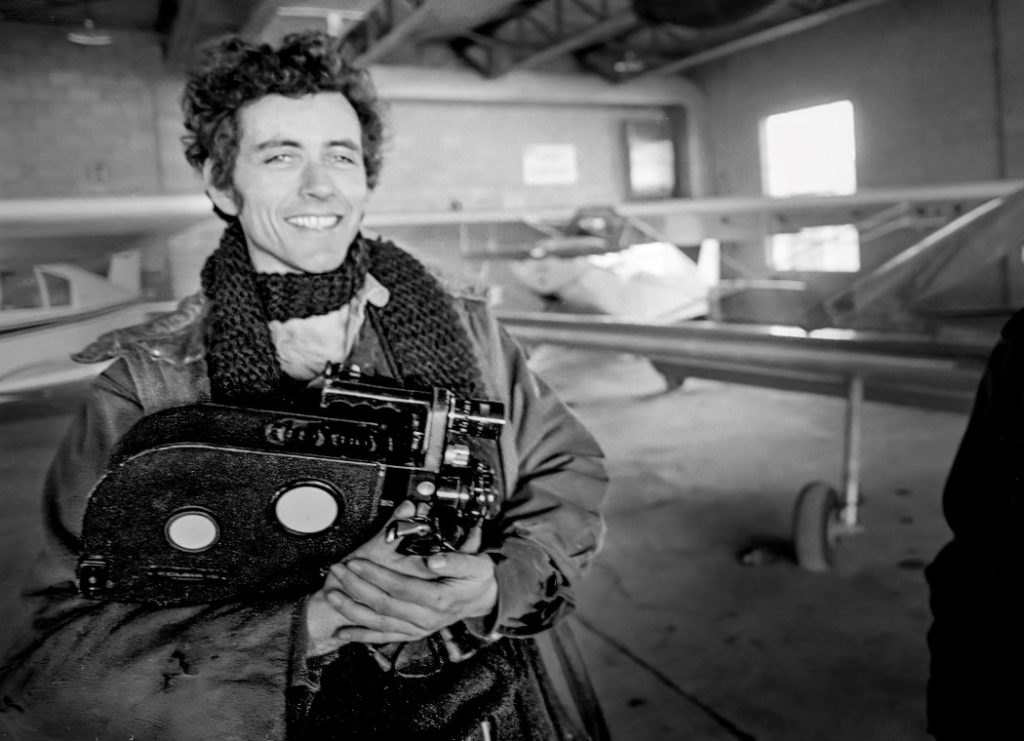
As Hayes’s doc gracefully interweaves stories about the couple’s relationship with Duckworth’s life and Schirmer’s, it draws on footage from his films. He worked on over 130 productions as director, co-director and/or cinematographer, many from the NFB; some are as personal as The Wish (1970), made to ensure that his exquisitely beautiful twin daughters would remain in his life after a collapsed first marriage, while others are engaged activist docs like A Wives’ Tale (1980). Duckworth’s voiceover throughout Dear Audrey augments the film’s intimacy and warmth.
Audrey Schirmer was Duckworth’s third wife. Norwegian Satu Repo, the first, became so estranged in Atlantic Canada that she tried to kill herself. When Duckworth met the second, Swedish mural artist Marianna Rydvald, she was pregnant with a daughter, Thiara, whose birth he watched and who is still in his familial orbit.
In many ways, Duckworth, now a vibrant 88, has a led a charmed, blessed, and adventurous life. But from his first two failed marriages to managing his and Audrey’s daughter Jacqueline’s autism, to Audrey’s Alzheimer’s diagnosis in 2013 and her death, he’s been through an onslaught of traumas. Through its innovative and evocative animation scenes, Hayes’s doc visualizes the night of Duckworth’s birth on March 8, 1933. It was literally a dark and stormy night, and in the animation, we see Duckworth’s father Jack trudging through an avalanche of snow to greet his newborn son.
Duckworth chuckles that the turbulent night of his birth previewed a stormy life. In a film with a no holds barred approach, his natural good humour sometimes veers into naked, painful emotions, and even tears. An article I wrote about Duckworth way back in the day quotes him about the car crash that almost killed him in Mexico, where he and Marianna lived an idyllic boho life.
Marianna was driving when they “got thrown apart in that car accident,” says Duckworth. “I went sailing through the front window, and the rest of the accident was knocked out of my memory.” Duckworth emerged from his post-crash coma ten days later, floating into a vision. “I woke up under this tree. There were buds on it, no leaves. It was all different shades of green, and the sky was a light green too. It was the most beautiful image I’ve ever seen.” Dear Audrey visualizes the crash and the vision in Josh Sherrett’s bold psychedelia.
To achieve all the film’s animation sequences, Hayes and Sherrett worked out a complicated process involving their storyboards being turned into footage of live actors, who were merged into a 3D animated world; the shots were then drawn frame by frame and turned back to 2D drawings. The technique gave Hayes control over visuals and a dense tactility he was after.
Overall, Hayes knew he needed to play out intimate moments between Duckworth and Audrey while repeatedly cutting away from them. “I didn’t want to ever have two apartment scenes back-to-back,” he told me. “After I show them in the apartment, the next scene is always something dramatically different. Going back to the past, or to a very different location. You get used to a rhythm: back-and-forth, back-and-forth.”
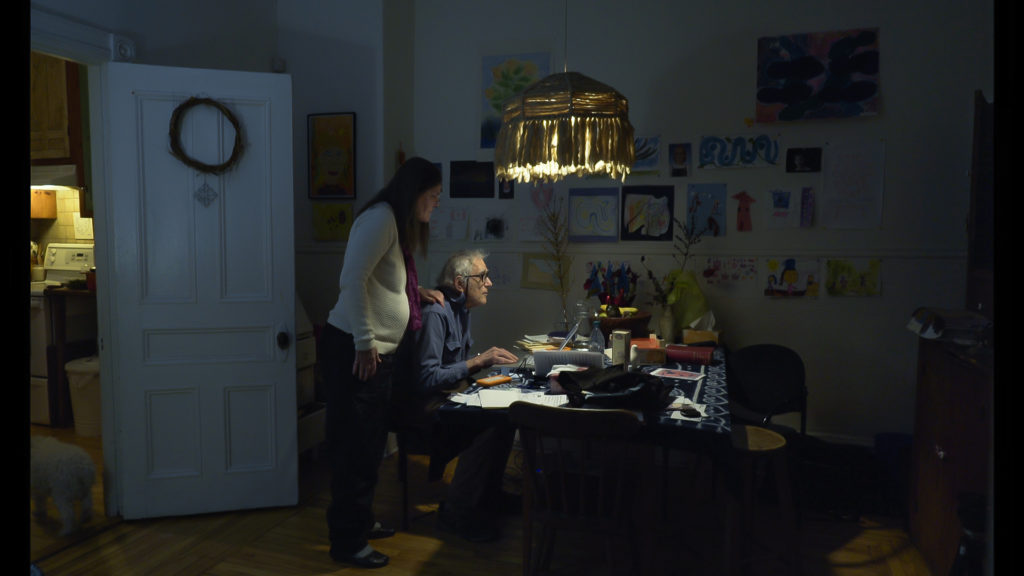
Duckworth was married to Marianna when he met Audrey, a talented still photographer and fervent activist, during a Vietnam War protest in Toronto. After waking up one morning in the “same bed,” as he delicately puts it in the film, some heavy self-questioning meditation in ethereal Machu Picchu led to choosing Audrey over Marianna, who had returned to Sweden. Counterpointed by a lovely animation sequence, Duckworth recalls, “I slept up there under the stars, sleeping under the ruins. I came to the conclusion I would have a much more secure and solid life with Audrey.”
To the Canadian documentary world, Duckworth is legendary for his fluid camerawork, idealism, and generous support of projects he deems worthy. Hayes recalls Duckworth lending him equipment that he needed when “no one in town would do that. ‘Pay me $40 a week,’ Martin said.” Hayes depicts Duckworth’s activism and the kind of films he directed and collaborated on. But by focusing on Duckworth’s love story with Audrey, and his other primary relationships, Hayes brings to light Martin Duckworth, the lover, father, and husband. During the 1960s sex and drugs rocket fire, Duckworth recalls, “I went along with the crowd in those endeavours.” A dyed-in-the-wool romantic, blessed with movie star looks, he embraced ecstasy and agony.
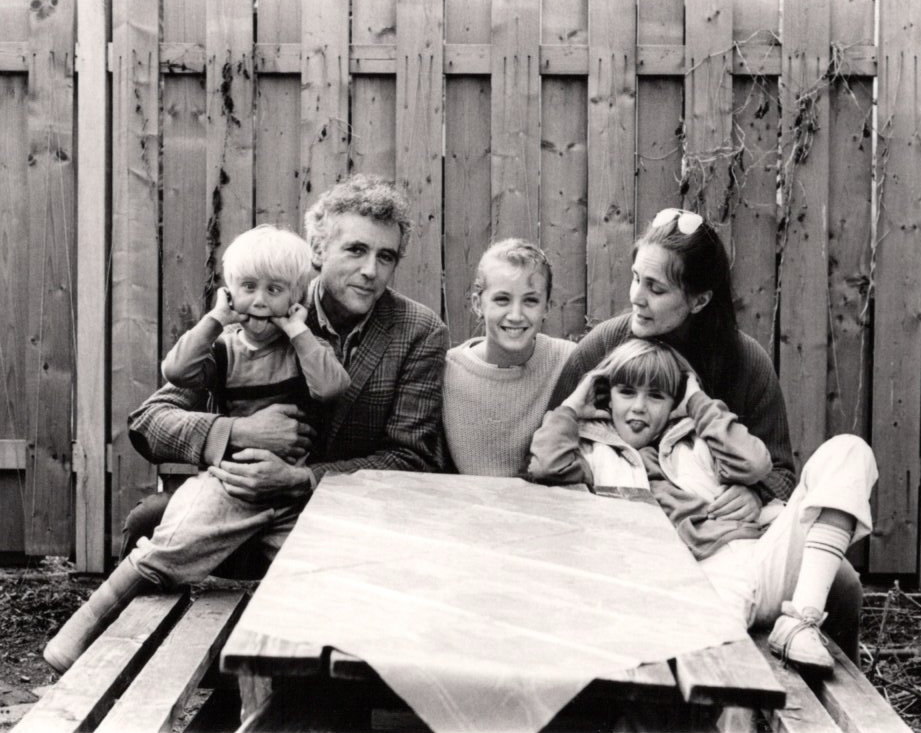
Duckworth and Audrey had three children together: Danielle, Jacqueline, and Nick. One chapter in the movie, and key sequences revolve around Jacqueline. In her teens, Jacqueline’s autism manifested itself by turning her into an often-uncontrollable fireball of chaotic energy, an enfant sauvage.
Now in her 50s and living in a residence after 19 years of Audrey devoting herself to Jacqueline, she is more calm, more aware, and very loving toward her father. In one scene, she reads to him from what seems to be a greeting card: “There’s no hiding a good man’s heart.”
In a strange foreshadowing of her mother’s eventual behavior, young Jacqueline would disappear, as eventually Audrey did, and hang out with homeless kids, some of whom pressured her sexually. When her parents found her, they rushed her to check for AIDS and other STDs.
In one of the doc’s most intense moments, Duckworth confesses that he couldn’t manage Jacqueline’s behaviour. His sex life with Audrey disappeared because he would sleep beside the girl’s door to ensure she wasn’t running away. They loved Jacqueline, but she bombarded them relentlessly with her manic energy. Duckworth admits directly to the camera that he shouted at his daughter, and sometimes slapped her because he didn’t understand her disease. His actions haunt him to this day.
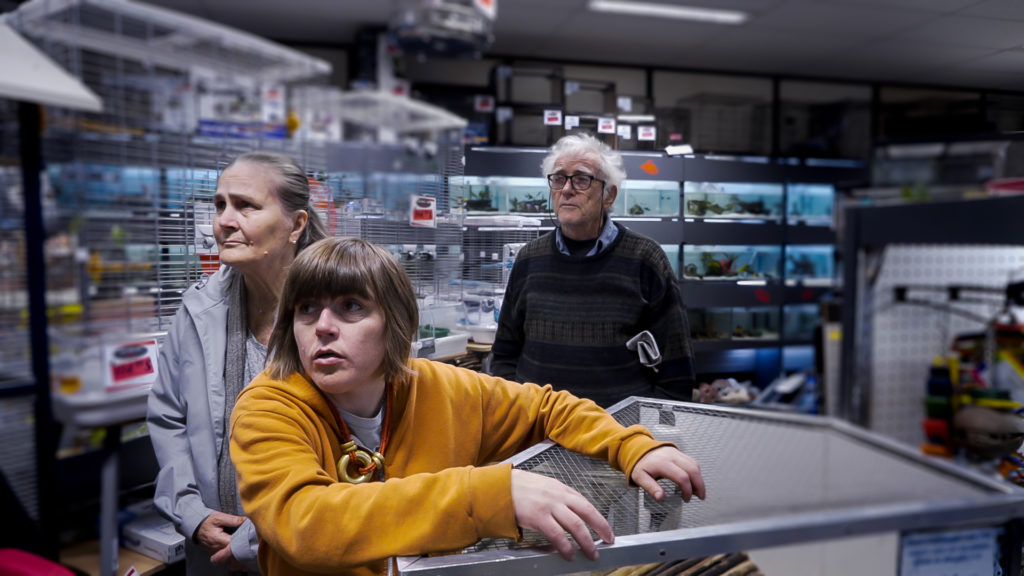
Hayes told me that he decided from the outset Dear Audrey would be a “warts and all film. I didn’t want it to be a promotional video about Martin. I didn’t want it to be a retrospective of his films. I wanted to show the inspirational character he is, and how he deals with Audrey. The love and care and all the choices he’s made throughout his life.” As for Duckworth’s painful confession about Jacqueline, “I showed that scene to Martin, and he said, ‘I’m glad you put it in, because it’s more authentic, it’s more believable.’”
The tree that filled Duckworth’s universe when he returned to life after the crash in Mexico, embodied who he is. Everything is about growing and flourishing. Fertility. As he says, “the divine creative energy that keeps us going.” For Duckworth, a whole lot of movies, and a whole lot of kids. Twins Marya and Sylvia with Satu; Natascha and Anana with Marianna; Nicholas, Jacqueline and Danielle with Audrey.
Duckworth has two “reticences” with Dear Audrey, which he considers a beautiful film. One is the absence of his daughter Anana and the other, “the 40 years during which Audrey and I collaborated on the making of films. It jumps from the time we met in 1971 to the time she went ill 40 years later. She collaborated on two major films and was the idea behind a lot of them. She helped me make critical decisions throughout my career and my life.”
Anana is actress Anana Rydvald, who created two one-woman, mask-wearing performances of plays about her family: Love, Child and the recent, The Sighlence of Sky, exploring her relationship with her half-sister Jacqueline. Rydvald works with and teaches mime, puppetry, and the use of theatrical masks. She also acts in movies like Denis Villeneuve’s Arrival. Duckworth does not come across as a shining knight in her performances.
Martin Duckworth really loves many aspects of women, including “their creative spirits,” he told me with a contemplative expression. “You’re a bit Leonard Cohen-esque,” I joked. Duckworth chuckled, and then mused, “I had three long-standing relationships, which resulted in children, and all of which came to sad endings. Not by way of intention on either part, but by way of bad luck. All of my other relationships were in between those three solid ones, they were temporary. And for the passing moment. But those were in periods of my life when I was at loose.”
Then there are the twins. Three sets: two children, four of fourteen grandchildren. Duckworth laughs. “I feel very fortunate.” Don’t you think that’s on the edge of magic, I asked him.
“It is not on the edge of magic. It is in the centre of it. It’s wonderful magic.”
Update: Dear Audrey screens in Toronto at the Revue Cinema on Oct. 24 and 25.




